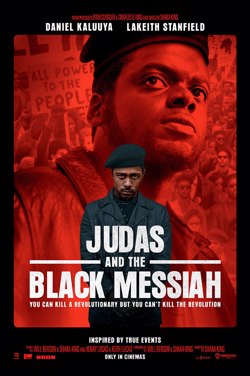
You might have heard that Cineworld cinemas are re-opening on May 19th. And we have an exciting line-up of films ready to restore the majesty of the big-screen experience. (Discover the full list of Cineworld re-opening movies.)
We're especially thrilled to be bringing you Judas and the Black Messiah. This Oscar-winning drama has generated a lot of attention for its Black Lives Matter-era relevance, not to mention its charismatic performances and assured sense of atmosphere.
As the film prepares to make its big-screen debut in Cineworld, here's everything you need to know before going in.
1. It's based on a shocking true story
The film is a dramatized take on real events that shaped the ideals of the black power movement. Fred Hampton is the charismatic chairman of the Illinois chapter of the Black Panther movement. It's a movement that is viewed with suspicion by the FBI for its alleged militancy and ability to incite people to violence.
Citing Hampton as a figure of interest, the FBI collars hoodlum William 'Bill' O'Neal after he impersonates a federal officer. The FBI coerces O'Neal into infiltrating the Black Panther movement and getting closer to Hampton. As the title suggests, a story unfolds that is resonant with a sense of betrayal, as Hampton must grapple with the responsibility of his position, and O'Neal must contend with the possible damnation of his soul.
2. It announces Shaka King as a director of style and confidence
Remarkably, King had only directed one film prior to Judas and the Black Messiah (2013's Newlyweeds). To say that he's grabbed hold of this story is an understatement. The film is, by turns, a character-driven drama, a chronicle of contemporary America and a story of black power. It walks the line between informative and entertaining, with King revelling in the period details, particularly the resonant soul soundtrack.
King wants his film to empower younger generations. He told ScreenDaily: "I want the youth, definitely from the black community but also from all oppressed communities, to know and understand their power and excellence. Can you imagine what would have happened had Fred Hampton been able to move forward with his rainbow coalition [of people from all backgrounds]? People even at a young age can effect change, just like we saw last summer. They can have power, particularly when they come together in numbers, to change history.”
3. It showcases an Oscar-winning performance from Daniel Kaluuya
Wordy and bizarre Oscar monologue aside (check it out here), Kaluuya is a magnetic presence as the rhetoric-driven Fred Hampton. The actor builds on his performances in the likes of Get Out and Queen & Slim to deliver an engrossing portrayal of a contradictory individual. As depicted in the film, Hampton is a confident orator but also someone who turns a blind eye to the potential impact of his fiery speech.
This becomes evident in the superb scenes Kaluuya shares with Dominique Fishback, playing Hampton's girlfriend Deborah. She becomes Hampton's moral compass and the person who makes him realize what is at stake personally in race-riven 1960s America. The two actors share an easy, gentle charm, which makes the film's violent moments all the more alarming. Thanks to the superb performances, this is history that you feel in your gut.
4. It confirms Lakeith Stanfield as a talent to watch
Just as impressive as Kaluuya is his fellow Get Out cast member Lakeith Stanfield. Although Kaluuya got the Oscar, Stanfield occupies more of the screentime, allowing us to sink into O'Neal's moral quagmire as he prepares to sell out Hampton to the authorities.
Particularly impressive are the sequences between Stanfield and Jesse Plemons, who plays the manipulative FBI agent responsible for getting O'Neal on board. Throughout the course of the movie, their interactions become increasingly loaded and euphemistic, as O'Neal is wined and dined at fine restaurants at the same time that his morals are eroded. Like everything else in the movie, director Shaka King observes these moments with calm and intelligent observation, not melodrama, inviting the viewer to assess the full extent of O'Neal's actions.
5. Whether it leaves you angry or inspired, you're sure to feel something
The tone of the film is perhaps best summed up by its Oscar-winning theme song 'Fight For You', performed by Grammy-winning artist H.E.R. The tone is a complicated mixture of anger, inspiration, despair and defiance, which embodies the torturous moral quandary at the centre of the story. If you emerge from the movie feeling these emotions, then it's assuredly done its job.
Click here to book your tickets for Judas and the Black Messiah, opening in Cineworld on May 19th.













.jpg)


.jpg)
.png)






